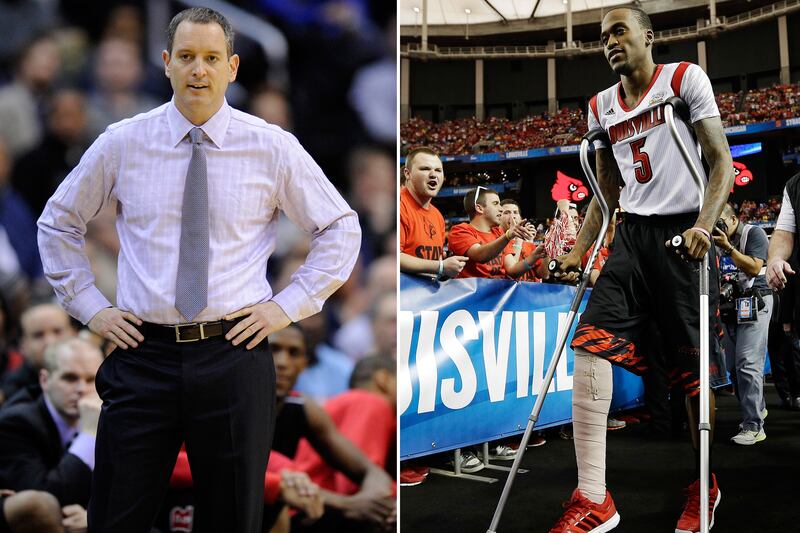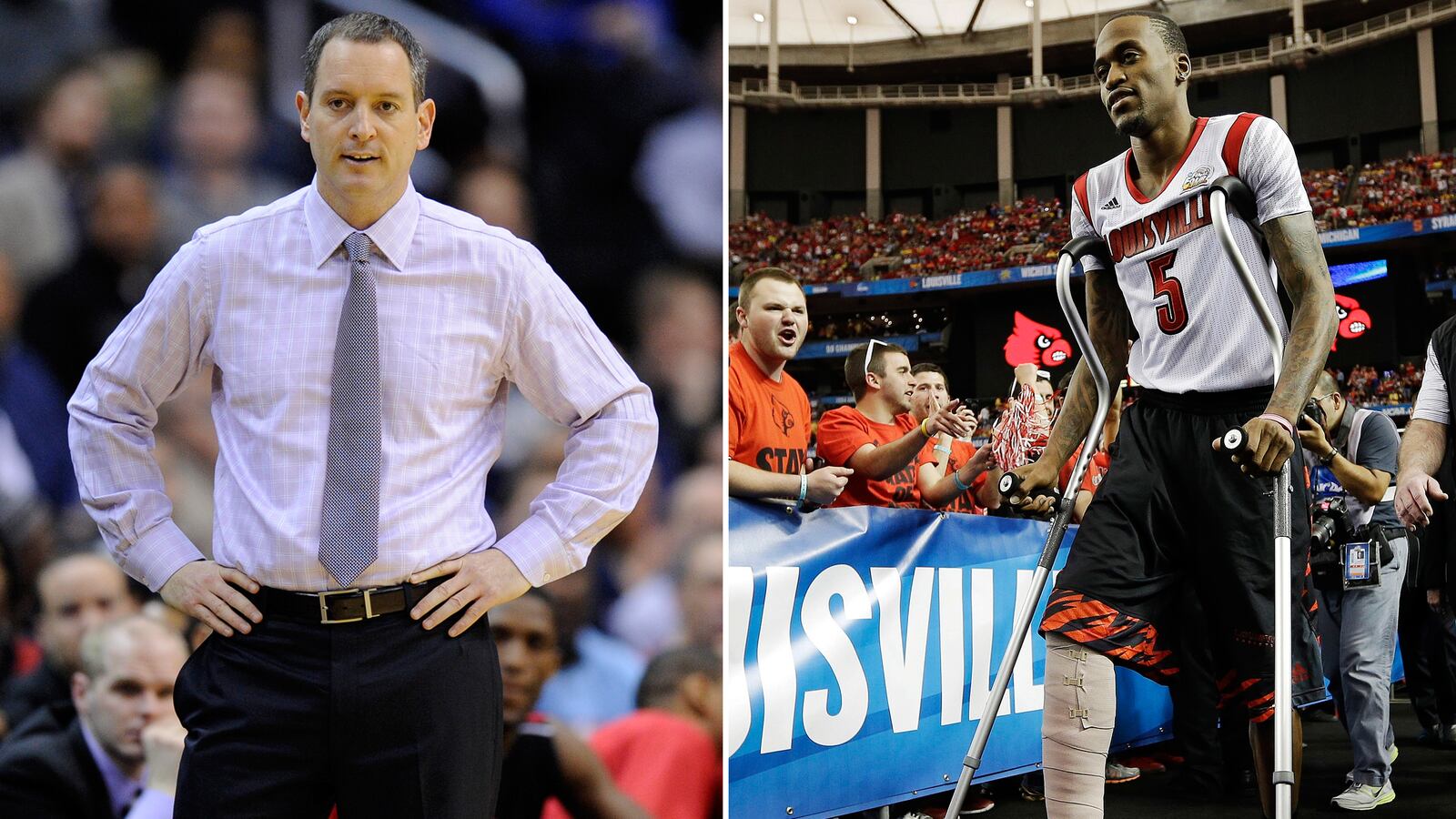The college-basketball brand name and the college-sports industry, which should be in full damage-control mode based on a number of incidents in the past week, will instead be in a celebratory mood Monday night. The men’s college basketball championship game will be played in an aging facility in Atlanta that was opened in September 1992. Atlanta politicians and the Georgia Dome’s chief tenant, the Atlanta Falcons NFL team, think the facility, which is good enough to hold college basketball's signature event, just doesn’t cut it anymore. Atlanta residents could kick in as much as a half a billion dollars in public subsidies for the new place.

It is probably fitting that the college basketball season will end in a “decrepit” building that allegedly needs to be replaced by a shinier version with enhanced revenue generators inside the facility. Like the NFL, college sports is all about making money and little else.
Three events have taken place this week that highlighted all the things wrong with college sports. University of Louisville player Kevin Ware suffered a compound fracture of his leg during a game against Duke. The injury looked pretty horrifying on television, and sportswriters and sports media critics were quick to point out a few things: that CBS showed remarkable control in showing just a couple replays of the injury, and that Louisville was able to show courage and overcome Ware’s devastating injury to beat Duke in the game.
What wasn’t discussed is the central core of complaints about the “student-athlete” system. Ware is part of the labor force that makes billions for big-time college sports. His injury could have cost him his scholarship and, in the extreme, the university may not have taken care of his injury-related health-care costs after he left the school. Insurance does cover medical costs for up to two years after an injury.
The very term “student-athlete” was invented in the 1950s by college administrators to shield schools from paying workers’ compensation. The schools make money off the athletes yet show very little concern about them. Louisville is paying for Ware’s medical expenses and plans to keep him on scholarship. He may be one of the fortunate ones, though.
Schools technically cannot revoke a scholarship because of an injury, but since scholarships are given on a year-to-year basis, colleges and universities can take away scholarships without cause.
The players are “amateurs” who are expected to be grateful for the scholarship and a chance at an education. The “amateurs” have to live with strict rules that include a limit on the amount of money they can earn from part-time jobs. The NCAA likes to scrutinize and monitor their chattel in the event that money flows their way from outside jobs. After all, the student-athletes already have a job: making money for the schools.
Those student-athletes not only should be happy that they can make money for coaches who at big-time schools make seven-figure salaries—they should also be happy to take both verbal and physical abuse from their coaches.
In 2010 Rutgers athletic director Tim Pernetti decided to hire a successful midlevel coach named Mike Rice to run the university’s basketball program. Rice was suspended for three games in December, fined $50,000, and ordered to go to anger management counseling for an unspecified incident. The “unspecified incident” became public last Tuesday on the ESPN daily news show Outside the Lines. A video surfaced showing Rice yelling gay slurs and slurs that degraded women and being physically abusive toward his players at practice.
In September 2010, Rutgers freshman 18-year-old Tyler Clementi jumped off the George Washington Bridge after his roommate set up a webcam and filmed Clementi having sex with another man. In 2007 members of the Rutgers women’s basketball team were publicly called a racial slur by TV and radio personality Don Imus. The university held outreach programs after both incidents.
Pernetti never fully explained exactly why Rice was given a three-game leave. Rutgers president Robert Barchi initially did his best Harpo Marx impression, then mimicked Sergeant Schultz, the Hogan’s Heroes character (“I hear nothing, I see nothing, I know nothing.”) The matter seemed to go away until the video surfaced.
Rice was fired, assistant coach Jimmy Martelli quit, Pernetti resigned, and Barchi is still the university president. That brings up a question about the National Collegiate Athletic Association. Where was the organization that claims that it is in existence to make sure student-athletes are treated with respect and dignity and that the schools understand that education comes first and athletics come second?
Was there a lack of institutional control in this case? And why did Pernetti seemingly fall on his sword and take the fall along with the school’s interim vice president and counsel, John B. Wolf, who reviewed the Rice video?
People knew about Rice’s behavior for months both inside and outside the program.
Former Rutgers director of basketball development Eric Murdock has filed a whistleblower lawsuit against the school. Murdock claims that he brought the matter to school officials’ attention and they fired him because of that.
Where was the NCAA before Tuesday? Probably investigating some claim that some kid had someone buy him a hamburger at a fast-food place, which violates NCAA rules.
The NCAA claims that the organization is all about protecting the student-athletes, but it failed the Rutgers community, from the student-athletes to everyday students with no stake in the basketball program, along with their parents, who have seen tuitions and student fees skyrocket and cuts in educational staff and classes.
While Ware and Rutgers took up the lion's share of attention, the integrity of college basketball was called into question this week in the Pac-12 Conference. The head of the conference’s officials, Ed Rush, quit after telling them he would give a referee $5,000 and a trip to Cancún if one of them gave Arizona coach Sean Miller a technical foul. (Rush said he was kidding). Perception being what it is, Rush may have put a bounty on Miller’s head during a meeting with his officials prior to the conference’s basketball tournament. Conference commissioner Larry Scott didn’t think Rush’s comment or joke was a fireable offense, but many people in the conference disagreed.
Integrity? It’s college sports, a sewer lacking ethics and a moral base. Just show college presidents, chancellors, provosts, trustees, athletic directors, and coaches the money. That’s the only thing the industry understands.





